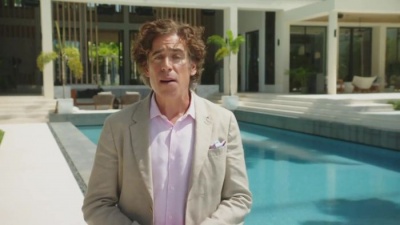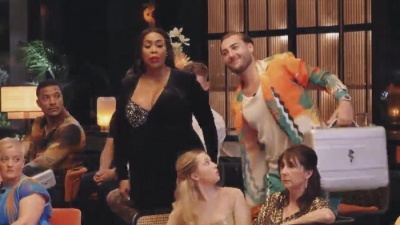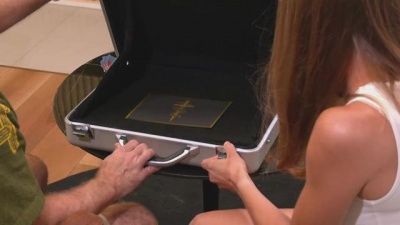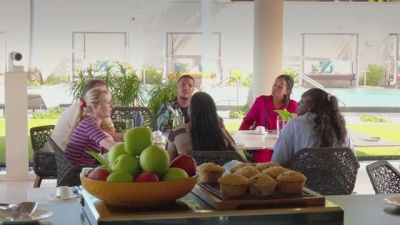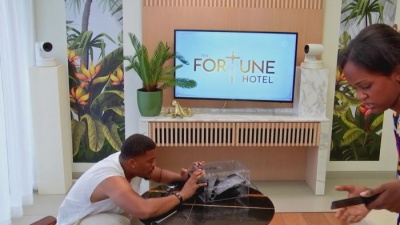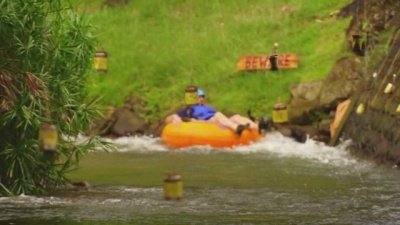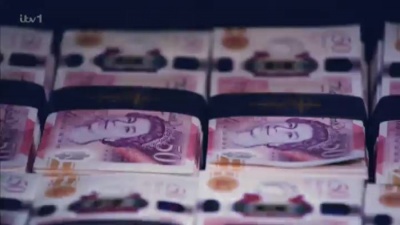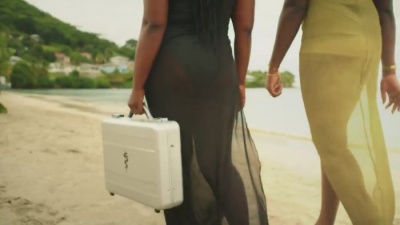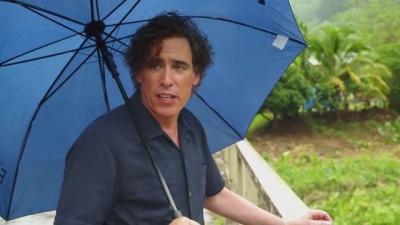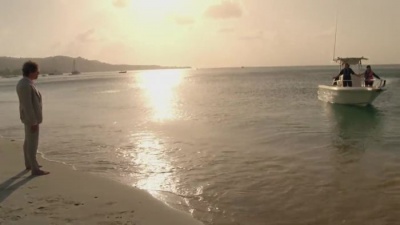Weaver's Week 2024-05-26
Last week | Weaver's Week Index | Next week
"Give John Major a go. I mean, Edwina Currie did." Honestly, Xander and Josh Widdicombe, you get shoved over to BBC2 for one day while some bloke washes his suit outside, and you make cracks like that!
Is it funnier than anything on this week's lead review?
Contents |
The Fortune Hotel
Tuesday's Child for ITV, 13-23 May
Stephen Mangan is back. The comedy actor has taken an expensive holiday to somewhere sunny. And hot. Probably in the Caribbean, though we're never told exactly where.
But Stephen is not alone. Ten pairs of contestants have followed his every move, and come to stay at the same hotel. What are the chances of that, eh? Over the first few minutes, we see the couples arrive, one by one. We get to look at them, see their introductory videos, and see them give pieces to camera in a two-seater room.
Once everyone has arrived, and are supping their fruit juice cocktails, Stephen comes down and introduces himself to his guests. Over the next eight programmes, we'll get to know some of them very well, but one couple will be out before tonight's closing credits.
The guests choose their rooms. Inside each room is a white metal briefcase. Eight of the cases are full of nothing, they have many blank pieces of paper. One of the cases is full of something, pieces of paper marked £50 and printed in an unfamiliar pattern. And one of the cases is full of weights and padding, and contains a sturdy black card.
Each night, whoever holds that black card will be out of the game. At the end of the series, after seven nightly eliminations and other shenanigans, whoever is holding the fortune will be able to take it, and book their place on the All Time Winners List.
What happens in a standard day?
Dawn breaks, and the couples wake up. They're encouraged to discuss what happened in the previous episode, it gives the producers something to start the show with. Then they go down to the hotel's breakfast restaurant, where a meal of fruit and rolls and jams and pastries is prepared for them. We know it's a hot country because nobody ever asks for bacon and eggs. There's just a side-order of plotting and scheming between the various couples, speculation about who's got the money or the card.
Soon enough, the players are chased back to their rooms, for the first format point – the Room Service Challenge. Our players are given a task to do while in their rooms. Build a tower out of dominoes. Draw another pair. Pack a suitcase so that you're in the middle of the group. We get to cut round each of the teams, as they try to achieve the goal and win the task. But not for too long, this is a ten minute challenge, and provides some suspense around the first commercial break.
In the fullness of time, a winner emerges. The winning pair have an option: they can swap their own case with someone else's, without knowing what's inside it. Or they can peek into someone else's case, but must keep their own. In the first few episodes, peeks and swaps were done with the knowledge of the other pair; after half way, it was all done secretly, so only the winners knew what they'd done.
More knowledge, more sharing, more plotting and scheming. Loose alliances begin to build, and we might get an idea about where the episode is going to go, because The Fortune Hotel is edited in a very direct manner. We've no problem with a clear plot direction, and it's probably for the best that every result was somewhat foreshadowed in the episode.
Eventually, we're going off to the Day Trip Challenge. Literally going off, the contestants board a fleet of minibuses (no more than two pairs to a minibus) and are driven to their destination. This is a physical activity, shot with more than a little humour. Throwing coconuts at bottles representing your fellow players, guiding each other through walkie-talkies, and racing around town trying to take various pictures – just some of the activities.
Each challenge will give us a complete ranking of the couples. Sometimes, it'll produce the ranks from the order of finishing – whoever completes the challenge first is the winner, whoever is next comes second and so on. Other times, things are done in groups and the winning group decide amongst themselves what the order is going to be.
This is important for the final part of the day, the Nightcap. All of the couples gather in the hotel bar, bringing their suitcases with them. In order – in the order determined in the Day Trip Challenge – the couples have a decision to make. They can stick with the case they have. Or they can swap with another couple, hope to grab the money, or foist the card to someone else. Whoever's got the card after this round of swaps is out of the game.
It can quickly be seen that whoever has the last swap – whoever won the earlier Day Trip Challenge – is in a very powerful position. They should be able to avoid being eliminated, and may be able to grab the money for themselves. This is useful as, from the third episode onwards, whoever's got the money is able to withdraw £10,000 for themselves. The money couple also get to decide who starts the next show with the dreaded card.
There were a few twiddles to the format, most notably a night where everyone had to swap. It wasn't possible to swap cases out of the televised game – contestants were only allowed to exchange briefcases, or look in each other's cases, in the formal swaps. We'll cover the final night a bit later.
Strategy and critical reception
Clearly, there is advantage in having the money case. For much of the show, it's a £10,000 advantage. But there's also advantage in having the "early checkout card", you know exactly where it is, and can plan your strategy around it. It was rare for the team given the card to still have it at the end of the night, most often that team was able to dictate who left.
The major randomiser was the daily challenges. These were fair, in the sense that they weren't obviously rigged for or against anyone – success was down to the couple's own hard efforts, with a little bit of good fortune. And the challenges were fun – tearing around the island, whizzing on motorboats, they all made for good television.
Because there are so few opportunities to shuffle the cases around, it was quite easy for players to keep tabs on who had the money case, and who was likely to have the card. The only secret swaps came from the "room service challenge". Basically, we can presume that by episode four, everyone should know where the money is, and everybody can work out where the card is likely to start. The Fortune Hotel became a game of social engineering, alliances and deals and trust.
Pre-show publicity didn't explicitly make the connection, but allowed us to think that The Fortune Hotel wanted to be compared to The Traitors. The BBC show is another game where the viewers know everything, more than any individual team. Here on The Fortune Hotel, we're reminded at every turn what is in a couple's case, with sharp and to-the-point captions. The soundtrack took composed music by a great musician (in this case Paul Farrer of The Chase fame) and blended it with goth-pop covers and choral sounds.
Perhaps comparisons with The Traitors were an error. The closer comparison might well be with Survivor. Like the BBC1 flop, The Fortune Hotel is set on a tropical island, where there is sun and sea and sand. Except for when it's raining, as it seemed to do every couple of days. (Incidentally, they really seemed to go out of their way not to make much out of how luxurious the hotel was – we saw the insides of some reasonably spacious bedrooms, a swimming pool without a proper edge, and a hotel bar slash breakfast room. And that's it.)
Like on Survivor, the main game becomes to form alliances and cope with people's shifting allegiances. Playing the game with a straight bat will get you so far, but not to the end. Lying and conniving and cheating will get you to the final, but may not help you win it.
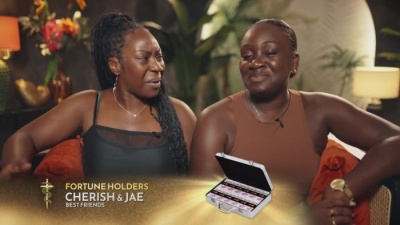 At a glance, we can see who's speaking, and their status in the game. One great detail: players always sat in the same order as on the caption.
At a glance, we can see who's speaking, and their status in the game. One great detail: players always sat in the same order as on the caption.
Unlike Survivor, the editors on The Fortune Hotel were able to tell their story cleanly and simply. In fairness, it was a very simple story, with obvious heroes and obvious villains each night, and not too much change from day to day. The edit wasn't perfect – one of the finalist couples was basically ignored in the first week, never getting the money or the card; another was mostly backgrounded for a few days. But the producers can only work with what they're given, and made the best out of the limited material.
We were worried that the show was going to be needlessly verbose – "Fortune Holders" for the people holding the money makes sense. "Fortune Chasers" for those with blank notes in their case, OK. "The Unfortunates" for the couple with the card, which was always described as "the Early Checkout Card" with capital letters. The "Nightcap" swapshop was often referred to as "The Nightcap in the Lady Luck Bar", which always grated a little, and is the one name we would remove from a future series.
Check out time
The final – padded out with a tearjerking summary of what each competitor had been through in their life – showed a slight lack of imagination. Both the Room Service and Day Trip challenges were out-of-the-box escape rooms, one to unlock a phone, one to get on a motorboat. Back at the hotel, the cases were locked, and the Room Service winners had the option to swap their case with someone else's – but didn't have to. Not until the final meeting in the bar was there another chance to swap.
Is there room for another run? Viewer reaction has been modest: those of us who stuck with it have been rewarded, but it was a very slow-burn series, and not a huge amount happened until episode four. Ratings have also been modest – we only have overnight figures, and they've consistently been around 2 million, which is about or just below the slot average.
ITV has a tactic of running 9pm shows stripped across a short period, a good way to balance the demands of streaming viewers (who want a whole series right now) and the majority of linear viewers (for whom one episode a night is enough). Stripped from Monday to Thursday across two weeks, The Fortune Hotel ran a little faster than might be ideal, but made sure that it didn't outstay its welcome. The nightly episodes meant that there wasn't much room for a big cliffhanger, a major decision to affect the result of the game – and the editors completely dropped that ball, we knew who would get the card, only the reaction would wait for Monday.
Overall, we reckon there's the germ of a good format in there. The show would have welcomed a bit more chaos – a forced swap behind the players' backs, or a peek in public just before the nightly swaporama. Sadly, players who had a good strategy tended to get voted out quite early – maybe a more strategic game would have come across better.
Would we watch a second series? Probably. And that's a reasonable metric of success: The Fortune Hotel was worth the watch.
In other news
163 million is the viewing figure for the Eurovision Song Contest. That's based on the number of people who saw a few minutes of any programme, final or semi-finals. It's up by a couple of million on last year, but still trails the new year celebration Chunwan Show in Communist China.
RTS Scotland award nominations, and we may have the Daytime category sewn up. One of Bridge of Lies, non-game Make it at Market, and Celebrity Antiques Road Trip will win the award (mutters something about CART going out in primetime, thinks better of it). Winners in this, and about two dozen other categories with no game show interest, will be named on 13 June.
The Got Talent semi-finals dominate the week on VM1 and ITV – live from Monday night, the final's next Sunday. Also the finals for Race Across the World (BBC1, Wed) and Taskmaster (C4, Thu).
Photos: Tuesday's Child.
To have Weaver's Week emailed to you on publication day, receive our exclusive TV roundup of the game shows in the week ahead, and chat to other ukgameshows.com readers, sign up to our Google Group.


